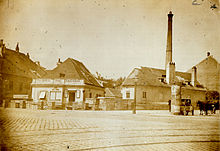Franz Löblich
Franz Löblich (born December 8, 1827 in Vienna ; † October 1, 1897 there ) was an Austrian entrepreneur and politician.
Life
Franz Löblich was already politically active and committed in his youth - in addition to his craft as a coppersmith. In 1848 he participated in the revolution in Dresden and in 1849/50 as a volunteer in the uprising against Denmark in Schleswig-Holstein. Franz Löblich used the economic boom of the founding period in Austria to expand his business, which had long remained a small coppersmith's business on a craft basis, and to expand it into a larger manufacture.
As a politician, Löblich was a councilor in Vienna, a member of the Lower Austrian state parliament and a member of the Imperial Council of the KuK monarchy . He was a committed democrat and, as a local politician, he was also district chairman of the 9th district of Alsergrund in Vienna . As a district politician, Franz Löblich campaigned very successfully for the development of the Alsergrund district in Vienna. His humanitarian work in the field of childcare is outstanding. Löblich lived at Sechsschimmelgasse 5.
A special achievement by Franz Löblich with lasting significance for today's ninth district of Vienna was the successful implementation of the choice of location for the construction of the Franz-Josefs-Bahnhof in 1872. The aim here was that this building would have a positive economic impact on its immediate surroundings should affect. As the political representative of the tradespeople in the Lichtental / Alsergrund, the local council and member of the state parliament or later district chairman of Vienna, Franz Löblich, had a supraregional perspective and great advantages for the district in mind and the train station on the route leading to the richest provinces was to remain in place for many decades to stimulate the economy in the district.
The construction of the Nussdorfer Straße market hall, which opened in 1880, was also the result of an initiative by Franz Löblich - an impetus for the inner-city economic revival in the district that is still effective today for urban development.
As an entrepreneur, he successfully participated in the 1873 World's Fair .
Franz Löblich was a Viennese councilor from 1863 to 1886, a member of the Lower Austrian state parliament from 1870 to 1871, and a member of the Austrian imperial council from 1879 to 1885. As court coppersmith of the imperial family, he headed the cooperative of coppersmiths in Vienna for 27 years and was a poor councilor for 16 years and orphan father and finally district leader of the 9th district from 1889 to 1897.
In 1893 the Löblich company was appointed supplier to the court of the KuK. The company he managed, dating back to 1738 and owned by the Löblich family since 1823, Löblich & Co. Kessel und Apparatebau KG is active in the areas of catering technology and heating technology and is still owned by the descendants of Franz Löblich today .
family
Praiseworthy was married to Franziska Weissenberger (1831–1912) and the father of eleven children: Max , Leopold , Franz, Friedrich, Emil, Oskar, Robert, Franziska, Franz II., Franziska II. And Josefine.
Franz Löblich died in 1897 and is buried in the family grave designed by Robert Oerley in the Weidlinger Friedhof near Vienna (the first work by this architect). In his memory, a Löblichgasse is named after him in both Vienna and Weidling .
Honors
- 1859 Citizenship of Vienna for Leopold and Franz Löblich
- Imperial and Royal Coppersmith (1893)
- Poor council and district leader of the IX. District of Vienna
- Member of the Vienna City Council
- Member of the Imperial Council of the Imperial and Royal Monarchy
- Member of the Lower Austrian Landtag
- Head of the Cooperative of Coppersmiths in the Imperial Capital Vienna
- Local school council chairman of the IX. District of Vienna
- Founder and honorary president of the kindergarten association and soup and tea establishment in the 9th district
- President of the Caroline Riedl'schen Children's Hospital Vienna IX.
- Honorary member of the Vienna Central Crib Association
- Local director of the Marie-Valerie crèche and the first Viennese school kitchen
- Chairman of the Boys' Employment Institution Vienna IX.
- Chairman and honorary member of numerous commercial and social associations
- Namesake of Löblichgasse in Vienna, 9th district (1898)
- Naming of the Löblichgasse at the family summer residence in Klosterneuburg / Weidling (Lower Austria)
- Honor bust in the Vienna City Hall, Volkshalle
- Participation in the Vienna World Exhibition in 1873
- Anniversary trade exhibition Vienna 1888: Honorary diploma
literature
- Ingrid Haslinger. Customer - Kaiser. The story of the former imperial and royal purveyors . Schroll, Vienna (1996). ISBN 3-85202-129-4
Web links
- Biographical data from Franz Löblich in the Biographical Handbook of the Lower Austrian Parliament 1861–1921
- District Museum Alsergrund
| personal data | |
|---|---|
| SURNAME | Praiseworthy, Franz |
| BRIEF DESCRIPTION | Austrian entrepreneur and politician, member of the state parliament |
| DATE OF BIRTH | December 8, 1827 |
| PLACE OF BIRTH | Vienna |
| DATE OF DEATH | October 1, 1897 |
| Place of death | Vienna |




